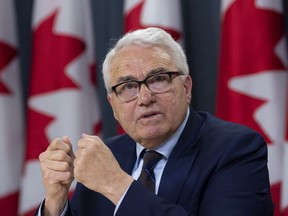Raymond Théberge says the Coalition Avenir Québec government has gone too far by targeting English school boards and English universities.

Canada’s Official Languages commissioner has sharply criticized Premier François Legault’s government for its plans to dismantle English school boards and weaken English universities.
“You have to fight for the schools you have, the school boards that you have,” Raymond Théberge told a Montreal conference about English education on Thursday.
The meeting spent much of the day focused on how the Coalition Avenir Québec government has treated English education since coming to power in 2018.
Théberge, whose role involves protecting language rights across Canada, vowed to help in the court fight against the plan to scrap school boards.
“Yes, it will end up in front of the Supreme Court of Canada and we will be there to defend Section 23 every time,” he said, referring to the Canadian Charter of Rights and Freedoms.
The Legault government has also targeted English universities. It wants to increase funding for French institutions and reduce the number of students who don’t speak French.
Quebec significantly hiked tuition fees for Canadian students from outside the province who attend English universities. It also changed the funding formula for international students.
Théberge, a franco-Manitoban, said he’s proud to hold a PhD in linguistics from McGill University.
He said he “fully understands” the English-speaking community’s concerns regarding Quebec’s decision to target English universities.
“The effects of this provincial policy, which are already being seen, may have a long-term negative impact on Quebec’s English-speaking communities,” he said.
“If you want to fund francophone institutions, fund them. Don’t come out and have this policy: we’re going to take money from Peter to give to Paul.”
He warned the changes may weaken Quebec’s English-speaking universities and expressed support for legal challenges by McGill and Concordia, who argue the policy will devastate their finances.
“I don’t think there’s anything gained with this policy and I would hope that in the future it will be turned back. Hopefully, the courts will do something about it.”
He said language issues ebb and flow.
“It comes in waves,” Théberge said. “Right now, we’re riding a wave — it’s not a good wave — but we’re riding a wave in terms of language politics in the province of Quebec.“
He applauded the English-speaking community’s “resilience and tenacity.”
The community has “a high rate of bilingualism and values the French language and culture.” It should “be seen largely as allies of French” in Quebec.
The two-day conference, organized by the Quebec English School Boards Association, brought together administrators, teachers and parents, as well as anglophone groups.
Concordia president Graham Carr said the tuition changes have led to a big drop in applications from outside Quebec, leading to a $15-million drop in revenue.
The policy is “essentially political,” he told the conference.
It’s “not data-driven, not evidence-based or even evidence-informed,” he said. Instead, the policy is based on “stereotypes and anecdotes.”
Carr said “the linguistic focus that has unfortunately been put on this policy is really tragic. Anglophone institutions, the anglophone community — we’re solid supporters of francization, of French, in Quebec.”
The conference also heard from Terry Kharyati, director general of Heritage College, an English CEGEP in Gatineau.
The Legault government’s Bill 96 targeted English CEGEPs by putting a cap on enrolment, adding more mandatory French courses and imposing a new, more difficult French test that students without an English eligibility certificate must write to obtain their CEGEP degree.
Kharyati said the changes further increase pressure on English-language education.
“The concern across the board is we don’t have enough support (from the Quebec government), and even if we had support, writing the French mother-tongue exam for some students is quite the tall order,” he said.
Thomas Mulcair, a former provincial Liberal minister and leader of the federal NDP who is now a political commentator, including in The Gazette, appeared at the conference. He referred to language “zealots” in Quebec — ”true believers who would do anything that they could to stir the language pot.”
He added: “This is one of the techniques of François Legault. I can absolutely, 100 per cent, assure you that François Legault has never read a single article of Bill 96.
“But politically, he’s got a nose and a sense that says if I’m stirring the pot with the anglophones and they’re reacting, maybe I’ll shore up some of my nationalist credibility.
“He is a relic of the 1950s and ’60s, going after the anglais.”
He said the anglophone community recently proved that it can push back against the CAQ government if it bands together and works with allies.
Mulcair urged the anglophone community to identify potential allies who can be counted on when issues arise.
That means getting to know local elected officials and CAQ MNAs, he noted. The community should also be working with Québec solidaire and the Conservative Party of Quebec, and not only the provincial Liberals, he said.
The call for unity was echoed by Eva Ludvig, president of the Quebec Community Group Network, a coalition of anglophone groups.
“We sometimes feel under siege from those who should be supporting us — our own governments,” she said.
“We need to find ways to move forward to deal with the difficulties we face, but we need to do this together as a community. We all need to speak with one voice, saying the same message. Together we are much stronger than alone.”